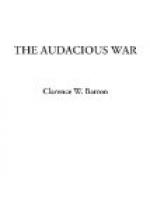Submarines, aeroplanes, and motor busses are three elements of warfare never before put to the test; and the greatest of these thus far is the gasolene motor-car. By this alone Germany may be defeated. France and England are rich in gasolene motor power, and supplies from America are open to them. A year ago there were less than 90,000 motor-cars in Germany, and Prince Henry started to encourage motoring to remedy this, but the Germans are slow to respond in sport. Indeed they know little of sport as the English understand it, of sportsman ethics or the sense of fair play in either sport or war. They do not comprehend the English applause for the captain of the “Emden” and stand aghast at the idea that he would be received as a hero in England. When a daring aeroplane flier in the performance of his duty has met with mishap and, landed on German soil, he is not welcomed as a hero. He is struck and kicked.
The German is not to be blamed. It is the way he has been educated to “assert himself,” as the Germans phrase it. Indeed, when the captain of the “Emden” was taken prisoner and was congratulated by the Australian commander for his gallant defense, he was so taken aback that he had to walk away and think it over. He returned to thank his adversary for his complimentary remarks. With true German scientific instinct he had to find his defeat in a physical cause, remarking, “It was fortunate for you that your first shot took away my speaking tubes.”
The English are sports in war,—too sporty in fact. General Joffre warned General French over and over again, “Your officers are too audacious; you will soon have none to command,” and his words proved true. The English officers felt that the rules of the game called upon them to lead their men. They became targets for the guns of the foe, until one of the present embarrassments in England is the unprecedented loss of officers.
This has now been changed and Kitchener insists that both officers and men shall regard themselves as property of the Empire, that the exposure of a single life to unnecessary hazard is a breach of discipline. For this reason Victoria Crosses are not numerous, less than two dozen having been conferred thus far; and it has been quietly announced that no Victoria Crosses will be conferred for single acts of bravery or where only one life is involved. It must be team work and results affecting many.
For this reason also it has been decreed that the 33,000 Canadians in training at Salisbury Plain shall not be put in the front until they have learned discipline in place of the American initiative.
These Canadian boys receive their home pay of four shillings, or $1 per day, while the English Tommy gets one quarter of this amount. The Canadians are fine fellows, feeling their independence and anxious to be on the firing line, but the War Office recognizes that soldierly independence cannot be allowed in this war. It is not improbable that the Canadian troops will eventually be dispersed that their strong individual initiative may be thoroughly harnessed under the organization before they are trusted in the trenches. They are not to be permitted to go there to be shot at, but to use their splendid physiques, fighting abilities, and patriotism—more British than the English themselves—in strict organization.




